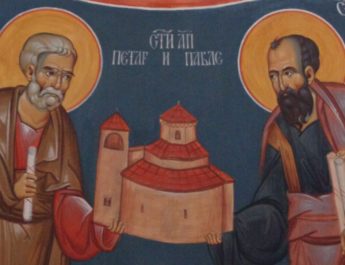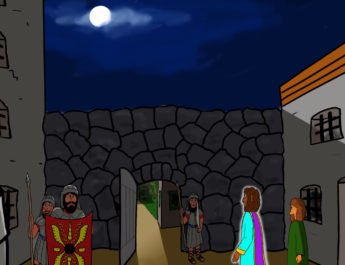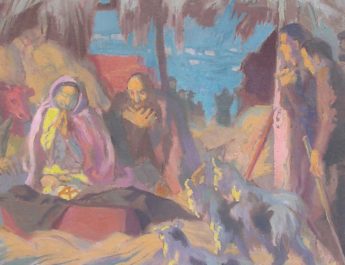1 Thessalonians 4:13-18
A Women’s Lectionary – Christmas Eve
13 But we do not wantA you to be uninformed,B brothersC and sisters, about those who have died,D
A “want” = thelo. This is to wish, desire, will, or intend. It is to choose or prefer in a literal or figurative sense. It can also mean inclined toward or take delight in. It can have a sense of being ready to act on the impulse in question.
B “uninformed” = agnoeo. From a (not) + noieo (to perceive, think, understand); {from nous (mind, understanding, reasoning faculty, intellect, capacity to reflect); from noos (mind); probably from the base as ginosko (to know, recognize, realize, perceive, learn; gaining knowledge through personal experience)}. This is unaware not to know. Sometimes it is willful ignorance, but other times it is simple not knowing.
C “brothers” = adelphos. From a (with, community, fellowship) + delphus (womb). This is a brother in a literal or figurative sense. It is also used of another member of the Church.
D “died” = koimao. 18x in NT. From keimai (to lie, recline, set, be appointed, be destined). This is to sleep or put to sleep. Figuratively, it can mean to die. In the New Testament, it is used 15x for death and 3x for sleep.
so that you may not grieveE as othersF do who haveG no hope.H
E “grieve” = lupeo. From lupe (pain, whether physical or mental; grief, sorrow, distress, a heavy heart). This is to be sad, grieve, distress, hurt, feel pain. It can be used for deep pain or severe sorrow as well as the pain that accompanies childbirth.
F “others” = loipos. From leipo (to leave behind, be lacking). This is the rest, remained, remnant, other, residue.
G “have” = echo. This is to have, hold, or possess.
H “hope” = elpis. From elpo (to anticipate, welcome, expect; usually to anticipate positively). This is expectation, hope, trust, confidence faith. The expectation can be abstract or concrete.
14 For since we believeI that JesusJ diedK and rose again,L even so, through Jesus, GodM will bringN with him those who have died.O
I “believe” = pisteuo. From pistis (faith, faithfulness, belief, trust, confidence; to be persuaded or come to trust); from peitho (to have confidence, urge, be persuaded, agree, assure, believe, have confidence, trust). This is to believe, entrust, have faith it, affirm, have confidence in. This is less to do with a series of beliefs or doctrines that one believes and more to do with faithfulness, loyalty, and fidelity. It is trusting and then acting based on that trust.
J “Jesus” = Iesous. From Hebrew Yehoshua (Joshua, the Lord is salvation); {from YHVH (proper name of the God of Israel; the self-existent and eternal one); {from havah (to become) or from hayah (to come to pass, become, be)} + yasha (to deliver, defend, help, preserve, rescue; properly, to be open, wide or free, which implies being safe. So, in a causative sense, this is to free someone)}. This is Jesus or Joshua in Greek – the Lord saves or the Lord is salvation.
K “died” = apothnesko. From apo (from, away from) + thnesko (to die, be dead). This is to die off. It is death with an emphasis on the way that death separates. It can also mean to wither or decay.
L “rose again” = anistemi. From ana (upwards, up, again, back, anew) + histemi (to make to stand, place, set up, establish, appoint, stand by, stand still, stand ready, stand firm, be steadfast). This is to raise up, rise, appear. It is to stand up literally or figuratively. Can also mean to resurrect.
M “God” = Theos. From Proto-Indo-European origins, meaning do, put, place. This is God or a god in general.
N “bring” = ago. This is lead, bring, carry, guide, drive, go.
O “died” = koimao. Same as “died” in v13. See note D above.
15 For this we declareP to you by the wordQ of the Lord,R that we who are alive,S
P “declare” = lego. This is to speak, say, name, call, command. It is generally to convey verbally.
Q “word” = logos. Related to “declare” in v15. From lego (see note P above). This is word, statement, speech, analogy. It is a word that carries an idea or expresses a thought, a saying. It could refer to a person with a message or reasoning laid out in words. By implication, this could be a topic, line of reasoning, or a motive. It can be used for a divine utterance or as Word – Christ.
R “Lord” = Kurios. From kuros (authority, supremacy). This is a respectful address meaning master or sir. It refers to one who has control or power greater than one’s own. So, it was also applied to God and Jesus as Master or Lord.
S “are alive” = zao. This is to live literally or figuratively. It is used for life including the vitality of humans, plants, and animals – it is life physical and spiritual and life everlasting.
who are leftT until the comingU of the Lord, will by no means precedeV those who have died.W
T “are left” = perileipomai. Related to “others” in v13. 2x in NT – both in this passage. From peri (about, concerning, all around, encompassing) + leipo (to leave behind, remain, lack, abandon, fall behind while racing). This is to leave behind, remain, survive.
U “coming” = parousia. From pareimi (to be present, have come) {from para (from beside, by, in the presence of) + eimi (to be, exist)}. This is presence, coming, arrival, advent. Properly, it was the term for an official visit of a king or someone else with formal authority. It is used specifically in the New Testament to refer to Jesus’s second coming.
V “precede” = phthano. 7x in NT. This is to arrive before, anticipate – coming before as a priority.
W “died” = koimao. Same as “died” in v13. See note D above.
16 For the Lord himself, with a cry of command,X with the archangel’sY callZ and with the sound of God’s trumpet,AA
X “cry of command” = keleusma. 1x in NT. From keleuo (to command, order, direct); from kelomai (to urge on). This is a shout, outcry, or call.
Y “archangel’s” = archaggelos. Related to “bring” in v14. 2x in NT. From archo (to rule, reign, begin; this is first in political status or power) + aggelos (angel, messenger, one who brings news or instructions); probably from ago (see note N above). This is archangel – an angel who has a superior rank.
Z “call” = phone. Probably from phemi (to declare, say, use contrasts in speaking to shed light on one point of view); {from phao (to shine) or phaino (to bring light, cause to appear, shine, become visible or clear). This is a voice, sound, tone or noise. It can also be a language or dialect.
AA “trumpet” = salpigx. 11x in NT. Perhaps from salpizo (to play a trumpet, to sound a trumpet blast literally or figuratively); perhaps from salos (tossing like the waves of the sea; agitation, vibration); perhaps from saino (wag the tail, flatter, beguile, move, shake; figuratively, to disturb); related to seio (to shake, vibrate; figuratively to agitate or show fear). This is a trumpet, bugle, or the sound that a trumpet makes.
will descendBB from heaven,CC and the deadDD in ChristEE will rise first.FF 17 Then we who are alive, who are left, will be caught upGG in the cloudsHH
BB “descend” = katabaino. From kata (down, against, throughout, among) + baino (to walk, go). This is to come down whether from the sky to the ground or from higher ground to lower. It can be used in a literal or figurative sense.
CC “heaven” = ouranos. May be related to oros (mountain, hill) with the notion of height. This is the air, the sky, the atmosphere, and heaven. It is the sky that is visible and the spiritual heaven where God dwells. Heaven implies happiness, power, and eternity.
DD “dead” = nekros. Perhaps from nekus (corpse). This is dead of lifeless, mortal, corpse. It can also be used figuratively for powerless or ineffective. It is where the word “necrotic” comes from.
EE “Christ” = Christos. From chrio (consecrate by anointing with oil; often done for prophets, priests, or kings). Literally, the anointed one, Christ. The Greek word for Messiah.
FF “first” = protos. From protos (what is first –the most important, the first in order, the main one, the chief); from pro (before, first, in front of, earlier). This is first or formerly. It could be first in a row, most important, or first relative to timing.
GG “caught up” = harpazo. 14x in NT. Perhaps from haireomai (to choose, take); probably related to airo (raise, take up, lift, remove). This is to grab with force, seize, pluck, get through robbery, snatch up. This is taking something openly and violently – not subtly or in secret.
HH “clouds” = nephele. From nephos (cloud; figurative for a great crowd or multitude). This is cloud or cloudiness.
togetherII with them to meetJJ the Lord in the air;KK and so we will beLL with the Lord forever.MM 18 Therefore encourageNN one another with these words.
II “together” = hama. 10x in NT. This is closely related – at once, together, at the same time.
JJ “meet” = apantesis. 3x in NT. From apantao (to meet, go to meet, encounter); {from apo (from, away from) + antao (to meet face to face)}. This is meeting. It is used to describe receiving an official who has just arrived. So, this is meeting someone in order to escort them into your area, house, etc.
KK “air” = aer. 7x in NT. From aemi (to breathe or blow). This is air – the atmosphere around us that we breathe.
LL “be” = eimi. Related to “coming” in v15. See note U above.
MM “forever” = pantote. From pas (all, every, each) + tote (then, whether past or future); {from hote (when); from ho (the)}. This is literally every when. It is always, at all times.
NN “encourage” = parakaleo. Related to “cry of command” in v16. From para (beside, by, in the presence of) + kaleo (to call by name, invite, to name, bid, summon, call aloud) {related to keleuo (see note X above)}. This is to call to, summon, invite, request, or beg. It can also be exhort or admonish. Also, this can be encourage, comfort, or console. This word has legal overtones and is used of one’s advocate in a courtroom. It is the root of the name of the Holy Spirit “paraclete” is our advocate and comforter.
Image credit: “A wanderer dancing the dance of stars and space” – barred spiral galaxy NGC 1097 by Hubble ESA.




